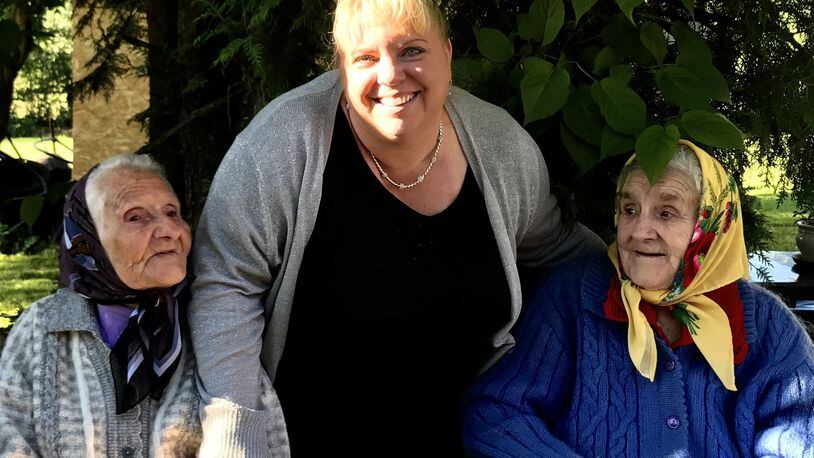Though she is no stranger to traveling, Campbell-Lieberman said that “this was the most emotionally, physically, and intellectually draining experience I have ever had.”
The group was “not sight-seeing,” she said, but visiting places where “thousands and thousands of people had been murdered” and learning from those who had lived through the Holocaust.
In Lithuania, for example, Campbell-Lieberman met two elderly women whose families hid Jews. They were some of “the Righteous Gentiles,” or non-Jews who rescued Jews during the Holocaust, that the JFR supports financially.
MORE: Procter & Gamble’s new ad ‘The Talk’ tackles racial bias
The group also visited a small Lithuanian town where, only two days after the Nazi invasion, locals “rounded up about 300 Jews, put them in a barn, and burned it to the ground, but there was not a Nazi in sight.”
Campbell-Lieberman remarked that “it was almost like being invaded gave them permission” to act on deeply-rooted anti-Semitic sentiments, and believes the incident shows that the horrors of the Holocaust can’t be blamed on the Nazis alone.
The other sites that stood out to Campbell-Lieberman were ghettos, or enclosed areas where Jews were held in terrible conditions, and concentration camps such as Auschwitz-Birkenau, which clearly showed that Jews “were truly treated as less than human, and the Nazis planned to wipe them off the earth.”
“[It was shocking] how immense [the camps] were,” Campbell-Lieberman said. “They weren’t small little things. It was daunting to realize how many people they held.”
While touring Auschwitz, the group got a behind-the-scenes look at barracks that are being restored. Campbell-Lieberman was impressed by the crew’s ’ “attention to detail, accuracy, and authenticity,” and has a kit of materials that could be used in science classrooms to teach students about the process and importance of preserving historical artifacts.
Throughout her journey, Campbell-Lieberman was constantly taking pictures and notes to send to her former students via Remind 101, Lakota’s texting communication system for teachers. Her study of the Holocaust, in fact, was initialized not by her own personal or academic connection with the tragedy but her students’ interest in it.
“I can’t give the kids enough information [about the Holocaust],” Campbell-Lieberman said. “They’re horrified and fascinated by it.”
MORE: Miami University, OSU could be impacted if affirmative action targeted
She thinks the Holocaust particularly interests the at-risk students she works with, despite the fact that many of them are “reluctant or non-readers,” because “many of my kids have had tough lives.”
She wanted to better understand the subject that fascinated them so much, so several years ago she took a course for educators at the Holocaust & Humanity Center in Cincinnati. The center nominated her for the JFR’s Summer Institute for Teachers at Columbia University, and participating in this intensive, high-level workshop opened the way for Campbell-Lieberman to visit Europe with the group this year.
Though she won’t be returning to the classroom in the fall, Campbell-Lieberman plans to share her experiences learning about the Holocaust and the large collection of academic materials she has collected over the years with the teachers she coaches. Learning about the Holocaust, she believes, continues to be important because “there’s so much prejudging based on religion or appearance now.”
“I hope to help students learn life lessons like standing up for what’s right and not being a bystander,” Campbell-Lieberman said. “[The Holocaust] has been a good tool for me as a teacher to help kids understand their roles as citizens of the world and the community.”
About the Author
